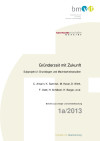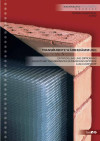Suchergebnisse für "Factsheet: Energietechnologien gestalten, die für alle sinnvoll und nutzbar sind"
IEA Bioenergy Task 39: Biofuels for the marine shipping sector (2017)

Im Auftrag des IEA Bioenergy Task 39 wurden von der Universität Kopenhagen ein Überblick und eine Analyse der marinen Infrastruktur, der Kraftstofftechnologien und der Vorschriften erstellt.
Chia-wen Carmen Hsieh, Claus Felby, University of Copenhagen
Herausgeber: IEA Bioenergie Task 39
Englisch, 86 Seiten
Downloads zur Publikation
Gründerzeit mit Zukunft

Subprojekt 2: Grundlagen und Machbarkeitsstudien
Schriftenreihe
01a/2013
C. Amann, K. Sammer, M. Havel, D. Wirth, F. Oettl, H. Schöberl, H. Berger, et al. Berichte aus Energie- und Umweltforschung 1a/
Herausgeber: BMVIT
Deutsch, 136 Seiten
Downloads zur Publikation
Call for Papers: 11. Internationale Energiewirtschaftstagung
Von 13. bis 15. Februar 2019 findet an der TU Wien die IEWT 2019 um das Thema "Demokratisierung des Energiesystems" statt. Kurzfassungen können bis 7. November 2018 eingereicht werden.
Development of a continuous hydrogen-carbon nanofibers production line
With the development of a hydrogen-carbon nanofiber production in a continuous process carbon nanofibers can be produced in an economic way and at the same time access to environmentally friendly hydrogen is enabled.
Neue Publikationen im Bioenergy Task 33
Im Rahmen des IEA Bioenergy Task 33: Thermische Vergasung von Biomasse wurden 2016 ein Newsletter, ein Status Report, ein Workshop Report sowie zwei Meeting Minutes veröffentlicht.
IEA Bioenergy Task 37: Report "Production of food grade sustainable CO2 from a large biogas facility GO’CO2 at The Korskro Biogas Plant, Denmark" (2020)

Der Report gibt eine Übersicht über Produktion von lebensmitteltauglichem nachhaltigem CO2 aus einer Biogasanlage in Dänemark
Lars Laursen
Herausgeber: IEA Bioenergy Task 37, 2020
Englisch, 4 Seiten
Downloads zur Publikation
Delphi Report Austria

Zukunftsorientierte Ansätze zur langfristigen Konkurrenzfähigkeit und Standortqualität Österreichs
Forschungsforum
4/1998
Herausgeber: BMVIT
Deutsch, 6 Seiten
Downloads zur Publikation
Recommendations for a consolidated Austrian research in the topic of "Smart Cities"
Based on a clear definition of the topics and focusing on energy relevant aspects the project will provide an overview on the present points of focus in research on "Smart Cities". Furthermore, future research topics will be defined and evaluated, and action plans for political stakeholders will be elaborated in the framework of two expert workshops.
CLIMA 2016 - Proceedings of the 12th REHVA World Congress

Die Proceedings der Konferenz: CLIMA 2016, 12th REHVA World Congress 2016 in Aalborg stehen zum Download bereit. Hierbei ist eine “Topical Sessions” zu IEA EBC Annex 64 (session 4) enthalten.
Per Kvols Heiselberg (Editor)
Herausgeber: IEA EBC Annex 64
Englisch
Downloads zur Publikation
Rainbow - Neues Fasermaterial aus Zellulose
Die neue Zellulosefaser Rainbow wird im Unterschied zur normalen Viskosefaser aus nachwachsenden Rohstoffen unter dem Prinzip des nachhaltigen Wirtschaftens gewonnen. Eine ressourcenschonendere Färbung ermöglicht enorme Einsparungen.
1000 Passivhäuser in Österreich 3. Dokumentationsperiode 2006 - 2008
3. Dokumentationsperiode des Gemeinschaftsprojektes der IG Passivhaus Österreich zur detaillierten Netzwerkdokumentation eines repräsentativen Querschnitts aller Passivhaus-Objekte in Österreich.
Nachhaltiges Bauen - Online Info-Session zum Universitätslehrgang
16. September 2020
Digitaler Meetingraum (Wien, AT)
Lehrgangsleiterin Ass.Prof. Dr. Karin Stieldorf stellt (Master-)Programm "Nachhaltiges Bauen" zur Vermittlung ökologischer, ökonomischer sowie soziokultureller Aspekte beim Planen, Bauen und Nutzen von Gebäuden vor und beantwortet Ihre Fragen.
Application of the Stirling cycle for environmentally compatible cooling - systems analysis
Conventional cooling has adverse effects on environment (eg. ozone depletion, global warming). One option for environmentally compatible cooling systems for near ambient temperatures (-10 to -50°C) is the Stirling cooler with environmental friendly process.
IEA IETS Task 17: Membrane processes in biorefineries (Working period 2023 - 2025)
Biorefineries are essential for the transition from petroleum- to a biobased industry. The use of biomass as raw material for recyclable materials, chemicals and energy sources is essential and requires efficient and sustainable production processes. This project aims to strengthen national and international know-how transfer between research and development for membrane-based processes in biorefineries. The focus is on application, improvement and innovation in all aspects of membrane distillation.
Stadt der Zukunft Vernetzungsworkshops
Ziel der Vernetzungsworkshops war es, Projektnehmer:innen des Förderprogrammes „Stadt der Zukunft“ einen Überblick über laufende und geplante Aktivitäten zu geben, startende Projekte kennenzulernen, sich mit diesen abzustimmen und zu vernetzen sowie bisherige Erfahrungen und Ergebnisse auszutauschen.
IEA Bioenergy Österreich Newsletter, Juli 2023

In der siebten Ausgabe des IEA Bioenergy Österreich Newsletters werden Highlights aus den österreichischen Beteiligungen an den Tasks des IEA Bioenergy Netzwerkes vorgestellt. Zusätzliche Informationen betreffen ausgewählte Projekte, Veröffentlichungen und Veranstaltungen.
Österreichische Taskdelegierte des IEA Bioenergy TCPs
Herausgeber: IEA Bioenergy TCP, 2023
Deutsch, 13 Seiten
Downloads zur Publikation
IEA Bioenergy: Österreich Newsletter Juni 2021

In der dritten Ausgabe des IEA Bioenergy Österreich Newsletters werden Highlights aus den österreichischen Beteiligungen an den Tasks des IEA Bioenergy Netzwerkes vorgestellt und ausgewählte Projekte, Veröffentlichungen und Veranstaltungen präsentiert.
Herausgeber: Österreichische Taskdelegierte des IEA Bioenergy TCPs
Deutsch, 17 Seiten
IEA HPT Annex 49: Multifunctional Facade with PV for Solar Autonomous Cooling Applications (2017)

Das Energiekonzept COOLSKIN konzentriert sich auf technische Lösungen zur Erreichung einer hohen Energieautarkie in der Betriebsphase, das heißt ohne Anschluss an das öffentliche Netz. Das COOLSKIN-Konzept adressiert auch einen hohen Vorfertigungsgrad der technischen Fassadenlösung.
T. Selke, T. Schlager, M. Rennhofer, A. Heinz, D. Brandl, T. Mach
Herausgeber: IEA HPT, 2017
Englisch, 12 Seiten
Downloads zur Publikation
Transparente Wärmedämmung

Entwicklung und Erprobung neuartiger transparenter Wärmedämmsysteme aus Kunststoff
Forschungsforum
2/2002
Herausgeber: BMVIT
Deutsch, 6 Seiten
Downloads zur Publikation
IEA 4E Annex: Electric Motor Systems. Working period 2008 - 2011
Promotion of energy efficiency of poly-phase electric AC motors and motor systems in relevant applications as pumps, fans, compressors and mechanical drives that are generally used in industry, infrastructure and large buildings. This work also included new technologies such as frequency inverters (adjustable speed drive) and permanent magnet motors.
